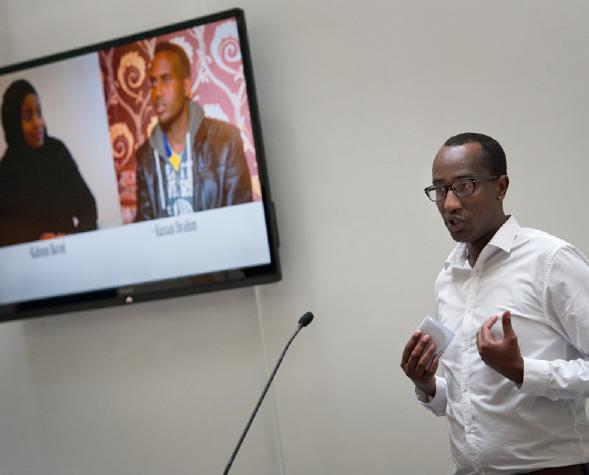
3 minute read
From a smuggler’s boat to studying for a Phd
A YOUNG Somalian who arrived in the UK after battling through adversity has become the first-ever asylum seeker to be admitted onto a PhD programme.
Abbas Roble travelled from Somalia through to the Libyan coast, on a people smuggler’s boat across the Mediterranean to Crete and then found his way through Europe to the UK.
Advertisement
He left Somalia with no formal education and was determined to educate himself after being released by UK immigration authorities.
Abbas joined a college in Leeds to take his GCSEs and an access to higher education course, after which he was offered a place to study physics at the University of Manchester.
However, he was forced to defer his place for two years after his immigration status halted his progress and his classification as an international student meant he had no access to student finance to help pay student fees.
Fortunately for Abbas, the Helena Kennedy Foundation’s Article 26 project granted him a full tuition fee bursary and a small grant that allowed him to begin his studies at the University Manchester.
Abbas began his studies in 2012
by Jack Colwell
and commuted from Leeds every day for three years as he was unable to afford rent.
This outstanding effort saw an appeal launched for him by staff and a tutor then offered to provide Abbas with free accommodation in term time for his final year.
Abbas has now obtained a first class Master of Physics with Theoretical Physics and will continue his journey at the university as he looks to start his PhD.
“Manchester is where new physics is born.
“It’s where the atom was split, the first computer was built and graphene was isolated,” said Abbas.
“The university is a world-leading institution for fundamental physics, and Manchester is a beautiful cosmopolitan city.
“I would highly recommend it to anyone who wants to have the perfect student experience.”
Dr Tim Westlake, university director of student experience, said “Abbas is an exceptional young man, and I’m delighted that the university has been able to support him in his studies.
THE government has introduced a new benefit cap limiting total income a household can receive to £20,000-a-year.
It says the move is designed as an incentive for those on benefits to move in to a job.
Work and pensions secretary
MEMBERS of Sasca News travelled to London to share their experience of starting a Somali newspaper with community groups from around the country.
Mohammed Wadi and Kowser Ahmed were invited to talk at the Somali Voices event along with MMU lecturer Dave Porter, who helps edit Sasca News.
The event in July in the heart of London was organised by the Media Trust, which set up the Somali Voices project, and was a networking event for more than 40 participants.



The event brought together Somali Voices participants from London, Manchester and Bristol to talk about the media representation of the Somali community.
The day was filled with:
• Discussions and insightful case studies
• The sharing of best practice from across the various projects
• A networking opportunity for people to meet other active members of the Somali community
Mohammed said: “Myself and Dave gave a hsort presentation on how Sasca News was set up and how important it is as a voice for the Somali community in Manchester.
“We talked about the difference the paper had made in the community and how we received help from Manchester Metropolitan University in producing the paper, as well as getting a grant from the city council to pay for printing costs.
“I think it inspired many people to go back and set up a newspaper in their own communities.”
As well as presentations, the event gave people a chance to meet up activists from around the country and share experiences – negative and positive – about how the Somali community is portrayed in the media.
It was agreed by many participants that the Somali community has been too slow to respond to negative publicity about their community, particularly in the light of high profile court cases.
Many participants talked about using the power of social media to counter negative publicity and to portray the Somali community in a positive light. Dave added: “It was very inspiring to see so many different groups from different parts of the country doing so many great things to help raise the profile of the Somali community.
“I hope that our tale of Sasca News in turn inspired others to go out and set up their own newspaper after seeing how easily it could be done. There was even talk of setting up a national Somali newspaper in the UK, which would be fantastic.”
Groups who took part in the event came from all across the country, including Bristol, Leicester, Manchester and London.
Damien Green said it was wrong that some claimants could receive more in benefits than the average wage and that the government was making it “as easy as possible” for claimants to get work, through free childcare offers and other measures.
Benefits affected by the cap include child tax credit, housing benefit, jobseeker’s allowance and income support.nHouseholds where someone works more than 16 hours a week are exempt.
Under the new cap, those living Manchester will receive a maximum of:
£384.62 per week (£20,000 a year) for a couple
How would like to write for Sasca News?
£384.62 per week (£20,000 a year) for single people whose children live with them
£257.69 per week (£13,400 a year) for single people who do not have children or whose children do not live with them






